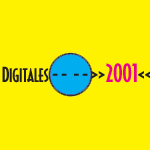|

 |
The
impact of technology transforms our daily lives, our
relationship with our work, with communications and
even with maternity. But if it is important for women
to be able to use technology as a tool, it must not
become a new means of alienation. They can open a new
space for thinking and creating.

|
As
part of the ADA
project, three associations have come together to deal with
those questions: Interface3,
a place and a team that train women and integrate them professionally
in the new technologies; Sophia,
a network co-ordinating feminist and gender studies; and Constant,
an organisation combining artistic and theroetical thought
on the internet and digital communication.
We propose three continuous days meetings and the sharing
of know-how, skills, abilities, experiences, dreams and questioning.
Accordingly we invite you to read the programme and build
your day out of practical workshops, presentations of projects
or research results, lectures and moments of informal, festive
exchanges.
Objective:
Find a common language to bring forward thoughts and to work
out a practice which would stimulate women's action in contemporary
society and which would bring awareness of the concept of
gender to the debates on new technologies by: - technological
and creative initiation - understanding of the work tool -
the critical analysis of new technologies - the discovery
and the construction of new images
Three
organising associations in Brussels
(see presentation in detail as in point 3):
- Interface 3 ASBL: a place and
a team of training and of occupational integration to new
technologies for women;
- Sophia: a coordination network
for feminist/gender studies
- Constant vzw: an organisation
binding artistic and theoretical reflection on the Internet
and digital communication.
Public:
people, internal participants, guests and the public, from
Brussels and other parts who: - have or want to use technologies
to earn their living and to provide for the needs of a family
- have professional and technical skills in the cutting edge
of information and communication technology, and alternative
systems - undertake university research in various disciplines
and in various countries, - create their artistic work by
using 'traditional' or 'new' media (film, video, Internet,
digital support) - are interested by feminist thought on contemporary
society
|
 To organise the Digital Days, we grouped three organisations
whose experience in the fields of equality and in the analysis of
gender is revealing, each one in its own field of investigation
and/or of action, and whose links with technology are different:
the need to find work in contemporary society, the analysis of this
society, a participation through production in this society.
To organise the Digital Days, we grouped three organisations
whose experience in the fields of equality and in the analysis of
gender is revealing, each one in its own field of investigation
and/or of action, and whose links with technology are different:
the need to find work in contemporary society, the analysis of this
society, a participation through production in this society.
This unique association's objective is to gather all energies and
competences:
- Because it is important for women to teach themselves to use
technology and to be aware of the place that they will occupy by
understanding the issues
- Because it is important that research be combined with groups
working in the field
- Because speech and artistic and cyber feminist acts occur in a
theoretical context and reflexive on the distribution and creation
tool used.

 Not
a day passes without the announcement of the impact of technology
on our daily lives, or the increasing role that women play (but
often as consumers). Technology is transforming our relationship
with work, communication, and even maternity. Not
a day passes without the announcement of the impact of technology
on our daily lives, or the increasing role that women play (but
often as consumers). Technology is transforming our relationship
with work, communication, and even maternity.
Not a day passes without one stressing the need to adapt one's training
and expectations of these new tools, or without warnings against
the inequality which will be born of new developments in computers:
to have computer access or not, to understand them or not, to make
use of them or be used by them. Moreover, industries, and certain
university departments, often by lack of manpower more than for
the sake of equality, try to attract women and especially young
girls' hopes towards sciences and technologies.
The European Treaty of Lisbon in March 2000 listed as one of its
priorities "the control of new technologies", with an economic aim,
but also of equality and of cultural participation of Europe in
international development. The issue is serious. Some see in technologies
only a tool for the liberalisation of trade, coupled with a control
and supervision structure, which will only worsen the fracture between
North and South, the divide between the poor and the rich. But we
also know that we can expect more from these tools. The Internet,
for example, has appeared as a formidable place for creativity,
distribution space, and information.
But if it is important for women to handle these tools, they must
not be alienated from them. The image in the minds of teachers and
employers of the relationship between women and the new technologies
must therefore be changed.

 We chose a "real" place - a training centre and a centre
for research and activity documentation which are also houses in
the city, and a shared time - three whole days allowing personal
and collective courses, hoping thus to avoid the "passive consumption"
of information that the "woman and new technologies conference"
in an impersonal room usually offers. We hope that the joint work
of the "DIGITALES" will open the way to other joint projects, in
other real "real" or virtual places.
We chose a "real" place - a training centre and a centre
for research and activity documentation which are also houses in
the city, and a shared time - three whole days allowing personal
and collective courses, hoping thus to avoid the "passive consumption"
of information that the "woman and new technologies conference"
in an impersonal room usually offers. We hope that the joint work
of the "DIGITALES" will open the way to other joint projects, in
other real "real" or virtual places.

 info@digitales-online.org
info@digitales-online.org
|
 ]
]



